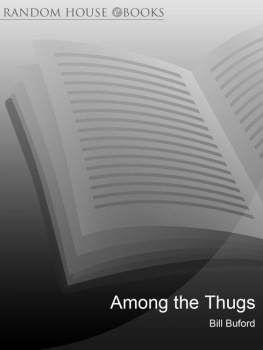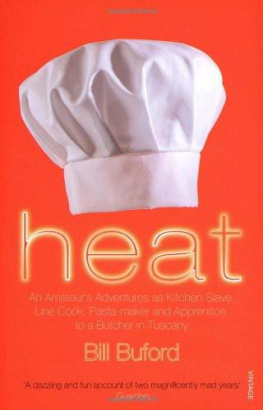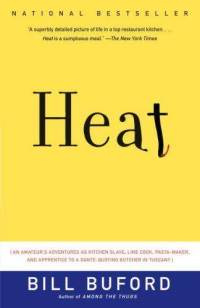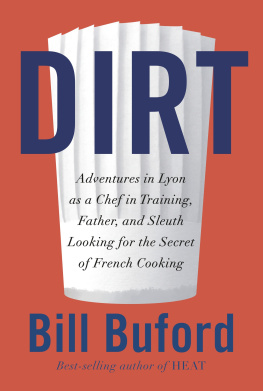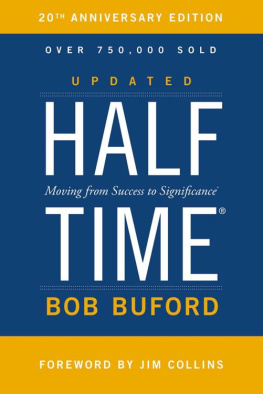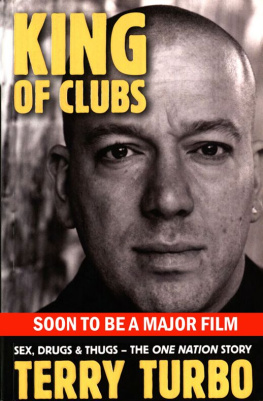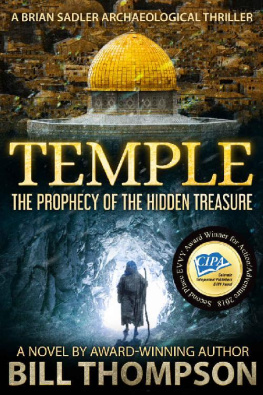ABOUT THE AUTHOR
Bill Buford, born in Baton Rouge, Louisiana in 1954, has lived in England since 1977. He is the editor of the literary magazine Granta .
Sizzling writing to rival the best of white-heat gonzo journalism
New Statesman and Society
A very readable, often funny book
The Economist
A pavement-level view of blood and beer and sweat and fear; of running feet and breaking glass, punctuated by sickeningly random viciousness
John Stalker, Sunday Times
Bufords book is important in that it offers a far more compelling explanation for football violence than any offered by the pundits of Left and Right... Had Bufords account been written by a tabloid reporter or an academic sociologist it might be more easily dismissed. That it comes from a highly intelligent observer, and a neutral outsider with no axe to grind, makes his book all the more powerful and yet troubling
Michael Crick, Independent
His prose is tough and vivid
ID
Buford creates with the majesty of a Tom Wolfe the ultimate price paid by so many for this footballing fever the Hillsborough disaster, recalled with electrifying eloquence and power
Time Out

This ebook is sold subject to the condition that it shall not, by way of trade or otherwise, be lent, resold, hired out or otherwise circulated without the publishers prior consent in any form (including any digital form) other than this in which it is published and without a similar condition including this condition being imposed on the subsequent purchaser.
Epub ISBN: 9781446439654
Version 1.0
www.randomhouse.co.uk
Reissued by Arrow Books in 2001
Copyright Bill Buford 1991
The right of Bill Buford to be identified as the author
of this work has been asserted by him in accordance
with the Copyright, Designs and Patents Act, 1988
First published in the United Kingdom in 1991
by martin Secker & Warburg
This edition first published in 1992 by Mandarin paperbacks,
reprinted 13 times
Parts of this book have appeared in The Sunday Times and Esquire
www.randomhouse.co.uk
Addresses for companies within The Random House Group Limited can
be found at: www.randomhouse.co.uk/offices.htm
The Random House Group Limited Reg. No. 954009
A CIP catalogue record for this book
is available from the British Library
ISBN 9780099416340
For Stephen Booth
CONTENTS
PART ONE
A STATION OUTSIDE CARDIFF
One of the causes of the downfall of Rome was that people, being fed by the State... ceased to have any responsibility for themselves or their children, and consequently became a nation of wasters. They frequented circuses, where paid performers appeared before them in the arena, much as we see the crowds now flocking to look on at paid players playing football... Thousands of boys and young men, pale, narrow-chested, hunched-up, miserable specimens, smoking endless cigarettes, numbers of them betting, all of them learning to be hysterical as they groan or cheer in panic unison with their neighboursthe worst sound of all being the hysterical scream of laughter that greets any little trip or fall of a player. One wonders whether this can be the same nation which had gained for itself the reputation of being a stolid, pipe-sucking manhood, unmoved by panic or excitement, and reliable in the tightest of places. Get the lads away from thisteach them to be manly.
R. Baden-Powell
Scouting for Boys (1908)
SOME TIME AGO, I came home from Wales by train. The station was a village station just outside Cardiff, and I arrived early. I bought a cup of tea. It was a cold Saturday evening, and only three or four other passengers were on the platform. A man was reading a newspaper, rocking back and forth on his feet. We waited, and there was an announcement on the loudspeaker about an unscheduled train. A little later, there was another announcement: the unscheduled train was about to appear, and everyone was to stand ten feet from the edge of the platform. It was an unusual instruction, and the man with the newspaper raised an eyebrow. Perhaps, I thought, it was a military train of some kind. A few minutes later, police appeared, emerging from the stairs nearby.
The train was a football special, and it had been taken over by supporters. They were from Liverpool, and there were hundreds of themI had never seen a train with so many people insideand they were singing in unison: Liverpool, la-la-la, Liverpool, la-la-la. The words look silly now, but they did not sound silly. A minute before there had been virtual silence: a misty, sleepy Welsh winter evening. And then this song, pounded out with increasing ferocity, echoing off the walls of the station. A guard had been injured, and as the train stopped he was rushed off, holding his face. Someone inside was trying to smash a window with a table leg, but the window wouldnt break. A fat man with a red face stumbled out of one of the carriages, and six policemen rushed up to him, wrestled him to the ground and bent his arm violently behind his back. The police were over-reactingthe train was so packed that the fat man had popped out of an open doorbut the police were frightened. For that matter, I was frightened (I remember my arms folded stupidly across my chest), as was everyone else on the platform. It was peculiar: I was at a railway station where everyone around me spoke Welsh; I was there to catch a train: then this sudden display. I thought that it was intended for us, that this violent chant was a way of telling us that they, the supporters, were in the position to do anything they wanted.
The train left. It was silent.
I got home at one-thirty in the morning, and the country seemed to consist of a long cordon of police. At Paddington Station two hundred officers were waiting to escort everyone from the platform to the Underground. I changed trains four times; three were taken over by supporters. One was torn apart: the seats had been ripped out, and the bar, which had been closed beforehand, was broken up, its metal shutter-door split into pieces and drink handed out to anyone who walked past. I did not know what was more surprising, the destructiveness, which was gratuitous and relentless, or that, with so many police, no one seemed able to stop it: it just went on. Hoping to avoid trouble, I sat in a first-class carriage at the very front of one train, opposite a man who had paid for his first-class ticket. He was a slim, elegant man with a thin moustache, wearing a woollen suit and expensive, shiny shoes: a civilized sort of fellow reading a civilized sort of booka hardback novel with a dust-jacket. A supporter had been staring at him for a long time. The supporter was drunk. Every now and then, he lit a match and threw it at the civilized mans shiny shoes, hoping to set his trousers on fire. The civilized man ignored him, but the supporter, puffy and bloodshot, persisted. It was a telling image: one of the disenfranchised, flouting the codes of civilized conduct, casually setting a member of a more privileged class alight.
It was obvious that the violence was a protest. It made sense that it would be: that football matches were providing an outlet for frustrations of a powerful nature. So many young people were out of work or had never been able to find any. The violence, it followed, was a rebellion of some kindsocial rebellion, class rebellion, something. I wanted to know more. I had read about the violence and, to the extent that I thought about it, had assumed that it was an isolated thing or mysterious in the way that crowd violence is meant to be mysterious: unpredictable, spontaneous, the mob. My journey from Wales suggested that it might be more intended, more willed. It offered up a vision of the English Saturday, the shopping day, that was different from the one I had known: that in the towns and cities, you might find hundreds of police, military in their comprehensiveness, out to contain young, male sports fans who, after attending an athletic contest, were determined to break or destroy the things that were in their way. It was hard to believe.
Next page
